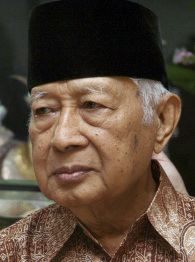
INDONESIA'S former dictator Soeharto was last night in a critical condition in a Jakarta hospital, with doctors struggling to prevent multiple organ failure.Doctors at the hospital said they feared for the life of the 86-year-old former general.His health deteriorated over five days at his colonial-era house in the Jakarta suburb of Menteng, where he lived as a recluse."We can say his condition has worsened, is more serious than before," said Joko Raharjo, one of the doctors."
Another heart pacemaker needs to be fitted. We are afraid he could suffer organ failure, so we have recruited some specialists from several hospitals to try everything to avoid organ failure," he said.Doctors said Mr Soeharto's kidney and lung functions had deteriorated and he would likely need dialysis.President Susilo Bambang Yudhoyono, also a former military general, paid a 12-minute visit to Mr Soeharto's bedside yesterday morning. But Mr Soeharto could not speak."His condition is critical," Dr Yudhoyono said. "The team of doctors are doing everything they can for the health of former president Soeharto. We have to pray for success."Mr Soeharto, who ruled Indonesia for 32 years before being toppled in a pro-democracy uprising in 1998, has been in and out of hospital in recent years for strokes and intestinal bleeding.Doctors say he has suffered permanent brain damage and some speech loss from the ailments. But in a rare recent interview Mr Soeharto, whose family amassed a multibillion- dollar fortune during his rule, expressed his surprise at an Indonesian court decision to order Time magazine to pay him a staggering $US109.9 million ($A125.8 million) in defamation damages.
"I am becoming rich, suddenly," he told Gatra magazine.Time magazine has prepared a 100-page challenge to the defamation payout to Mr Soeharto.The magazine had alleged that Mr Soeharto had transferred stolen money abroad.The case was to be considered by a panel of judges in Indonesia's Supreme Court, possibly this month.Mr Soeharto was rushed to the Pertamina Hospital in South Jakarta late on Friday suffering from anaemia, or low hemoglobin, and intestinal oedema, a swelling of the intestines caused by a build-up of fluids, doctors said yesterday.Mr Soeharto was conscious and received visitors, including from several ministers in his former regime, it was reported.A decade after his downfall in the wake of the Asian financial crisis, Mr Soeharto remains a controversial and divisive figure in Jakarta, where authorities have revived a $US1.4 billion civil suit against him for alleged corruption when he was president.The case relating to a charitable foundation Mr Soeharto once chaired had stalled because of his poor health.
Dr Yudhoyono has vowed to tackle endemic corruption in the country of 230 million people, and authorities have initiated court action to recover tens of millions of dollars that was allegedly illegally obtained by Mr Soeharto's youngest son, Tommy, in the 1990s.Dr Yudhoyono is scheduled to chair a United Nations meeting in Bali on January 28 that will discuss new ways to recover stolen state assets in foreign countries.Indonesian authorities say there is evidence the Soeharto family has large amounts of assets stashed in European banks.The country's National Commission for Human Rights is also examining six periods of social upheaval that led to mass deaths during Mr Soeharto's rule to see if they can be classified as "gross violations of human rights".These include a brutal crackdown against members of the now defunct Indonesian Communist Party in the 1960s, and conflicts in Aceh and Papua.
Comments